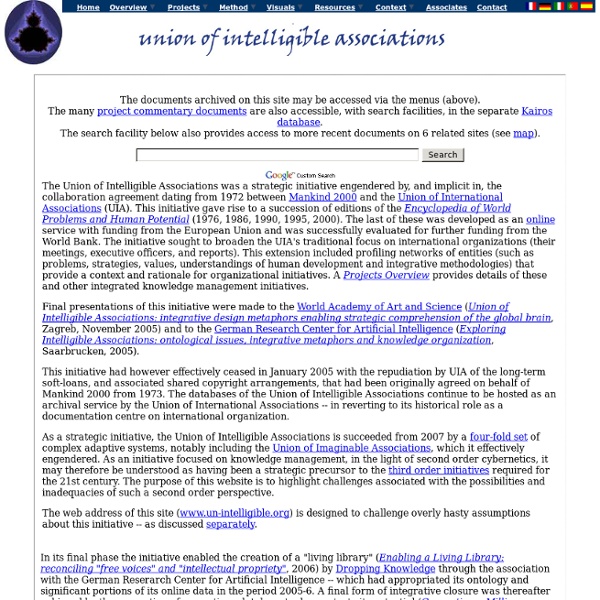



BASE (moteur de recherche) Un article de Wikipédia, l'encyclopédie libre. BASE est un moteur de recherche développé dans le cadre du projet Open Archives Initiative par l'Université de Bielefeld (Allemagne). Il est fondé sur la technologie Fast Search & Transfer (en), et a contribué au projet européen Digital Repository Infrastructure Vision for European Research (en) (DRIVER). BASE effectue l'indexation automatique des bibliothèques numériques utilisant le protocole Open Archives Initiative Protocol for Metadata Harvesting (OAI-PMH). Il se distingue d'autres moteurs de recherche par sa spécialisation académique, la capacité de trouver des ressources appartenant au Web profond (ou Web invisible, non indexé par les moteurs commerciaux), l'utilisation de la recherche plein texte et la présentation des résultats de recherche accompagnés des données bibliographiques. Moteur BASE Portail sciences de l’information et bibliothèques
UN data Scientific Commons | A Community for Scientific Information Google Scholar Unsafe Search While Google and Yahoo allow you to filter pornography and explicit sexual content from your search results using their "SafeSearch" feature, they do not provide a means to search exclusively for such adult material. It's a shame when someone searching for pornographic material related to, say, llamas, is forced to slog though many pages of perfectly innocuous llama sites before finally hitting upon the llama porn he was looking for. And very few people who do a Google search for "nice tits" want to find a site like this one. Use this form to conduct an "unsafe search." New! Most recent searches: Unsafe Search Statistics
Simulations back up theory that Universe is a hologram A ten-dimensional theory of gravity makes the same predictions as standard quantum physics in fewer dimensions. At a black hole, Albert Einstein's theory of gravity apparently clashes with quantum physics, but that conflict could be solved if the Universe were a holographic projection. Credit: Artist's impression by Markus Gann/Shutterstock A team of physicists has provided some of the clearest evidence yet that our Universe could be just one big projection. In 1997, theoretical physicist Juan Maldacena proposed1 that an audacious model of the Universe in which gravity arises from infinitesimally thin, vibrating strings could be reinterpreted in terms of well-established physics. Maldacena's idea thrilled physicists because it offered a way to put the popular but still unproven theory of strings on solid footing — and because it solved apparent inconsistencies between quantum physics and Einstein's theory of gravity. References Maldacena, J. Download references About this article Cowen, R.
Refdoc Refdoc est momentanément indisponible pour cause de maintenance. Nous vous prions de nous en excuser et vous invitons à vous reconnecter ultérieurement surwww.refdoc.fr Obamacare is having one huge success nobody knows about People are, rightly, upset about all that's going wrong with the president's health-care law. But something unexpected is going very, very right. (Mark Wilson / GETTY IMAGES) The background here is that before the rollout of the Affordable Care Act there were a lot of people eligible for Medicaid who simply didn't know it. The publicity around the new health-care law has led a lot of those people to inquire about whether they're eligible for health insurance -- and they're finding out that they are. The effect is also present in the blue states. The result is that while the expansion of health-care coverage still isn't working nearly as well as it needs to be, it's actually making preexisting coverage expansions work better than they ever have.
Sweet Search Barry Lando: China Profits From U.S.-Pakistan Shipwreck China Profits From U.S.-Pakistan Shipwreck Posted on Dec 2, 2011 By Barry Lando The killing of 24 Pakistani troops by NATO forces last Saturday is just the latest disastrous chapter in U.S.- Pakistan relations. As affairs go from bad to catastrophic, it’s not just the Taliban who will benefit but also China. For several years now the Pakistanis have found China a very willing and increasingly powerful counterweight to the Americans and their often strident political demands. Toeing Washington’s line, in other words, is no longer the only option. Every crisis in American-Pakistani relations is a golden opportunity for China. Take, for instance, the outrage in both the U.S. and Pakistan after American troops secretly entered Pakistan on May 2 to kill Osama bin Laden. As U.S. During that trip, China’s premier proved his friendship by announcing that China would, without charge, supply Pakistan with 50 JF-17 fighter jets equipped with sophisticated avionics. Such efforts are obviously paying off.